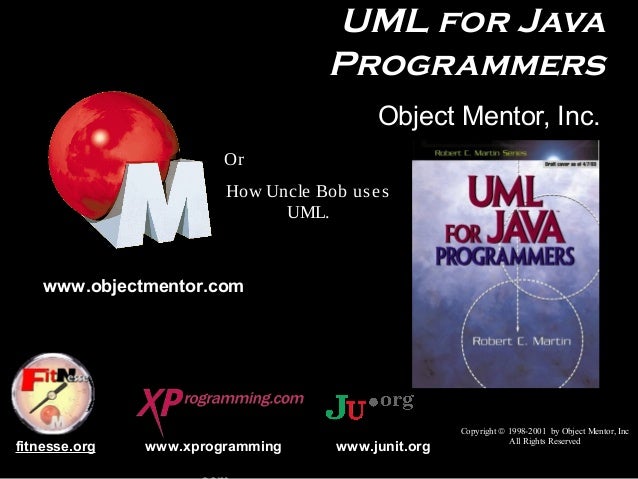The Unified Modeling Language has become the industry standard for the expression of software designs. The Java programming language continues to grow in popularity as the language of choice for the serious application developer.
Using UML and Java together would appear to be a natural marriage, one that can produce considerable benefit. However, there are nuances that the seasoned developer needs to keep in mind when using UML and Java together. Software expert Robert Martin presents a concise guide, with numerous examples, that will help the programmer leverage the power of both development concepts. The author ignores features of UML that do not apply to java programmers, saving the reader time and effort. He provides direct guidance and points the reader to real-world usage scenarios. The overall practical approach of this book brings key information related to Java to the many presentations. The result is an highly practical guide to using the UML with Java.
The Unified Modeling Language has become the industry standard for the expression of software designs. The Java programming language continues to grow in popularity.
- Software development guru Robert Martin shows readers how to effectively and efficiently use UML to design and implement real-world Java.
- Available in: Paperback. UML for Java Programmers Robert C. Martin All the UML Java developers need to know You don't use UML in a vacuum.
MARTIN is President of Object Mentor Inc., a leading consultancy in object-oriented design, patterns, UML, agile methodologies, and eXtreme programming. He authored the JOLT Award-winning publication Agile Software Development: Principles, Patterns, and Practices (Prentice Hall) and the best-selling Designing Object-Oriented C Applications Using the Booch Method (Prentice Hall).
He edited Pattern Languages of Program Design 3 (Addison-Wesley), edited More C Gems, and co-authored XP in Practice with James Newkirk (Addison-Wesley). A well-known speaker at international developer's events, Martin edited the C Report for four years. UML for Java Programmers Robert C. Martin All the UML Java developers need to know You don't use UML in a vacuum: you use it to build software with a specific programming language. If that language is Java, you need 'UML for Java Programmers.'
In this book, one of the world's leading object design experts becomes your personal coach on UML 1&2 techniques and best practices for the Java environment. Martin illuminates every UML 1&2 feature and concept directly relevant to writing better Java software-and ignores features irrelevant to Java developers. He explains what problems UML can and can't solve, how Java and UML map to each other, and exactly how and when to apply those mappings. Pragmatic coverage of UML as a working tool for Java developers Shows Java code alongside corresponding UML diagrams Covers every UML diagram relevant to Java programmers, including class, object, sequence, collaboration, and state diagrams Introduces dX, a lightweight, powerfully productive RUP & XP-derived process for successful software modeling Includes a detailed, start-to-finish case study: remote service client, server, sockets, and tests.
Overview of UML for Java (TM) Programmers. Diagram Types. Class diagrams. Object diagrams. Sequence diagrams.
Collaboration diagrams. State diagrams. Working with Diagrams. Why build models of software?
Why should we build comprehensive designs before coding? Making Effective use of UML. Communicating with others. Back-end documentation. What to keep and what to throw away. Iterative Refinement.
Behavior first. Check the structure. Envisioning the code. Evolution of diagrams.
When and How to Draw Diagrams. When to draw diagrams and when to stop. But what about documentation?
And Javadocs (TM)? Class Diagrams. An Example Class Diagram. Class stereotypes. Abstract classes. Association stereotypes. Inner classes.
Anonymous inner classes. Association classes. Association qualifiers. Sequence Diagrams. Objects, lifelines, messages, and other odds and ends.
Creation and destruction. Simple loops. Cases and scenarios.
Advanced Concepts. Loops and conditions. Messages that take time.
Asynchronous messages. Multiple threads. Active objects. Sending messages to interfaces. Writing Use Cases.
What is a use case? Deejaysystem Video VJ-II 1.0.0. The primary course.

Alternate courses. Use Case Diagrams. System boundary diagram.
Miniature Books By Robert C. Bradbury
Use case relationships. Principles of OOD. Design Quality. Design smells. Dependency management. The Single Responsibility Principle (SRP). The Open.Closed Principle (OCP).

The Liskov Substitution Principle (LSP). The Dependency Inversion Principle (DIP). The Interface Segregation Principle (ISP).
The Practices: dX. Iterative Development. The initial exploration.
Estimating the features. Planning releases. Planning iterations. The midpoint. Velocity feedback. Organizing the Iterations into Management Phases.
What's in an Iteration? Developing in pairs. Acceptance tests.
Continual integration. Java Packages. Binary Components -.jar Files. Principles of Package Design. The Release/Reuse Equivalency Principle (REP). The Common Closure Principle (CCP). The Common Reuse Principle (CRP).
The Acyclic Dependencies Principle (ADP). The Stable Dependencies Principle (SDP). The Stable Abstractions Principle (SAP). Object Diagrams. A Snapshot in Time. Active Objects. State Diagrams.
Special events. Initial and final pseudostates. Using FSM Diagrams.
ICE: A case study. Heuristics and Coffee. The Mark IV Special Coffee Maker. A common, but hideous, coffee maker solution.
Missing methods. Vapor classes. Imaginary abstraction.
A Coffee Maker Solution. Crossed wires. The coffee maker user interface. Use Case 1: User pushes brew button. Use Case 2: Containment vessel not ready.
Use Case 3: Brewing complete. Use Case 4: Coffee all gone. Implementing the abstract model. Use Case 1: User pushes Brew button.
Implementing the isReady functions. Implementing the start functions. How does M4UserInterface.checkButton get called? Completing the Coffee Maker. The benefits of this design. How did I really come up with this design? SMC Remote Service: Case Study.
Caveat Emptor. The SMCRemote System. SMCRemoteClient Command Line. SMCRemote Communication Protocols. The Remote Sessions. SMCRemoteClient Conclusion.
Three-Level FSM. Tests for SMCRemoteClient. Tests for SocketService. Tests for SMCRemoteServer.
ServerController (SMC Generated).